|
|
|
Sort Order |
|
|
|
Items / Page
|
|
|
|
|
|
|
| Srl | Item |
| 1 |
ID:
146635
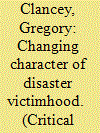

|
|
|
|
|
| Summary/Abstract |
Japan is periodically wracked by “Great Earthquakes” (daijishin) – seismic events so destructive that they leave massive amounts of textual and graphic evidence, much of it produced by people who did not experience the events directly. Using this cache of information, it is possible to see how the idea of the “disaster victim” has changed over time and circumstance. My paper traces this role across five Great Earthquakes that spanned roughly 150 years (1855–2011), a period convergent with modern Japan. I will argue that the sense of who and what has been victimized by the shaking of the earth – who has suffered, what weight to attach to their loss, what actions to take and emotions to feel regarding their situation – has changed regularly, and surprisingly, over this rather short period. There is, in other words, no common Japanese experience of victimhood, even in the context of one disaster type over a relatively short historical period. The article is one contribution to an as-yet unexamined history and comparative study of the modern role of disaster victim.
|
|
|
|
|
|
|
|
|
|
|
|
|
|
|
|
| 2 |
ID:
113279
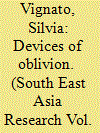

|
|
|
|
|
| Publication |
2012.
|
| Summary/Abstract |
Since the peace agreement has put an end to the 30-year-long civil conflict in the province of Aceh in Indonesia, poverty, parental loss, lack of opportunities and an old tradition have caused a growing number of Acehnese girls and boys to spend between three and ten years in residential Koranic schools [dayah or pesantren]. There, they process their experience of the conflict, be it direct or indirect. In this article, thanks to ethnographical data, the author explores this labour of transformation. An idea of resilience which is culturally based in local societies is analysed. Key issues are the difference between personal and social resilience, plus the transformations that a resilient process enhances in the very culture from which it stems. The dayah have proved very effective structures in facing the needs of the poorest Acehnese children. Nevertheless, the author argues, they tend to shape the children according to a general model that can create exclusion and crystallize pre-existing psychic suffering. This paper indicates that different visions of trauma and memory characterize different parts of the same society, and that selecting one or another is a political choice that is embedded in international policies.
|
|
|
|
|
|
|
|
|
|
|
|
|
|
|
|
| 3 |
ID:
124305
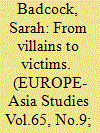

|
|
|
|
|
| Publication |
2013.
|
| Summary/Abstract |
This essay presents the subjective experience of life and sickness for the punished in late Imperial Siberia, and the distinctions the punished made between legitimate and illegitimate forms of punishment. The essay also explores state policies towards the sick punished, and explores how different levels of the Tsarist administration and local Siberian society dealt with the challenge of sick and decrepit exiles. It argues that conditions in Siberian prisons were, in general, worse than those in European Russian prisons in the post-1906 period, and that the experience of exile in eastern Siberia placed it among the most difficult locations for exile. Though neither the state nor the punished regarded illness as an integral part of their punishment, the prevalence of illness and disease compounded the cruelty of sentences.
|
|
|
|
|
|
|
|
|
|
|
|
|
|
|
|
| 4 |
ID:
185139
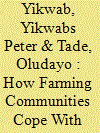

|
|
|
|
|
| Summary/Abstract |
A largely overlooked area in extant literature on farmer-herder conflict in Nigeria is coping strategies employed by internally displaced farming communities. Using exploratory design and qualitative data collection tools, we collected data from 23 purposively selected victims of farmer-herder conflict in Nasarawa State who were displaced and were either living in internally displaced persons camps or with friends/family. Findings showed that participants relied on their friends and family to cope with victimization experiences. Reported coping strategies included job switching, relocation to a safer place, formation of a vigilance group and trusting in God. The article recommends, among other things, empowering displaced populations with skills to cope with displacement challenges.
|
|
|
|
|
|
|
|
|
|
|
|
|
|
|
|
| 5 |
ID:
120661
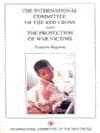

|
|
|
|
|
| Publication |
Geneva, International Committee Of the Red Cross, 2003.
|
| Description |
ixviii, 1161p.Pbk
|
| Standard Number |
0333747712
|
|
|
|
|
|
|
|
|
|
|
|
Copies: C:1/I:0,R:0,Q:0
Circulation
| Accession# | Call# | Current Location | Status | Policy | Location |
| 057312 | 362.87577/BUG 057312 | Main | On Shelf | General | |
|
|
|
|
| 6 |
ID:
107643


|
|
|
|
|
| Publication |
2011.
|
| Summary/Abstract |
Interviews conducted with leaders, combatants, witnesses, and victims in central Nigeria provide insight into the processes of volunteerism, recruitment, and indoctrination within armed groups. Identified are numerous avenues by which previously nonviolent citizens become willing perpetrators in deadly grass-roots conflict. Despite a commonly advertised motive for joining, narrative analyses reveal several diverse and underlying motivations. Six distinct combatant typologies are described: the Follower, the Pragmatist, the Criminal, the Soldier, the Basic Needs, and the Ideologue. The characteristics of each type, the timing of their entry into the conflict, and the implication for select intervention strategies are discussed.
|
|
|
|
|
|
|
|
|
|
|
|
|
|
|
|
| 7 |
ID:
124300
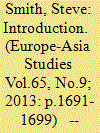

|
|
|
|
|
| Publication |
2013.
|
| Summary/Abstract |
The essays in this collection focus in different ways on the ambiguities and paradoxes of 'villains' and 'victims' in late-Imperial Russia and the early Soviet Union. They derive from a conference on 'Villains and Victims: Justice, Violence and Retribution in Late-Imperial and Early Soviet Russia', which was organised by Sarah Badcock and took place at the University of Nottingham on 6-7 April 2010. The title of the conference had a certain alliterative charm, which is compounded by the fact that most of the essays in this collection also concern violence: violence being the terrain on which villains and victims tended to meet.
|
|
|
|
|
|
|
|
|
|
|
|
|
|
|
|
| 8 |
ID:
160516
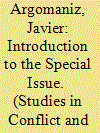

|
|
|
|
|
| Summary/Abstract |
This special issue examines the complex relationship between radicalization, victimhood. and political violence. The interrelatedness of victims and perpetrators has been long recognized in the fields of criminology and victimology but it is has been often ignored in the case of terrorism and political violence. The key aim of this issue therefore is to assist in enhancing our understanding of this interrelatedness with a particular focus on the relevance of narratives, roles, and identities of victimhood for both the victims and perpetrators. A second, more policy-relevant dimension is to examine the role of victims and perpetrators in the prevention of terrorism and political violence.
|
|
|
|
|
|
|
|
|
|
|
|
|
|
|
|
| 9 |
ID:
179317
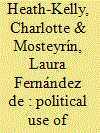

|
|
|
|
|
| Summary/Abstract |
Victims have become a topic of scholarly debate in conflict studies, especially regarding the impact of their activism on the evolution and termination of violence. Victims of terrorism are now enlisted within counter-terrorism, given their moral authority as spokespeople for counter-narratives and de-escalation. Our research explores how Spanish terrorism victims’ associations have evolved across eras of political violence and how they mediate the translation of international War on Terror discourses into Spanish counter-terrorism. We offer a topography of how the War on Terror has opened a ‘social front’ in Spanish counter-terrorism, with Spanish political elites prominently employing the victims’ associations to this end. Contemporary terrorism discourses are read back onto the memory of ETA, with victims’ associations assisting the equation of ETA with al-Qaeda and ISIS. Collective memory of the defeat of ETA has also contributed the veneer of ‘lessons learned’ to contemporary counter-terrorism measures. Our research explores the fluidity of terrorism-memory and the importation of global terrorism discourses into Spanish politics, relying upon interviews with key stakeholders in victims’ associations, local politics, and the research director of the new Victims of Terrorism Memorial Centre in Vitoria.
|
|
|
|
|
|
|
|
|
|
|
|
|
|
|
|
| 10 |
ID:
178006
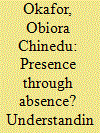

|
|
|
|
|
| Summary/Abstract |
This study examines the African Human Rights Action Plan (AHRAP) through the lens of Upendra Baxi's germinal theory on the emergence in our time of a ‘trade-related, market-friendly human rights’ (TREMF) thesis that is challenging the specific understandings of ‘people-centric’ human rights that are predicated in the letter and spirit of the Universal Declaration of Human Rights (UDH). Baxi contends, instead, that the dominant strands of the contemporary understandings of human rights are – for the most part – designed to protect the interests of global capital. That said, human rights frameworks in low-income countries need to be studied with a view to what they say and don't say about global capital. Despite its attempt to facilitate a progressive realisation of human rights in Africa, the AHRAP does not rise far enough above the TREMF paradigm to re-locate itself within the UDH one. This is due to the AHRAP not adequately theorising and analysing the role of capital in the (non)realisation of human rights in Africa. By allowing trade and market practices to slip to a significant extent beyond its purview, the AHRAP privileges – to a significant degree – the needs/interests of capital over the human rights of ordinary Africans. That is, the victims of the excesses of capital in Africa are reincarnated in the AHRAP document by the fact of their exclusion from it.
|
|
|
|
|
|
|
|
|
|
|
|
|
|
|
|
| 11 |
ID:
102508
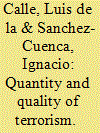

|
|
|
|
|
| Publication |
2011.
|
| Summary/Abstract |
This article presents a dataset of fatalities of domestic terrorism in Western European countries for the period 1965-2005. The Domestic Terrorism Victims (DTV) dataset, unlike others such as TWEED or GTD1, is based on local sources in each country and, consequently, it registers a higher number of killings. Measurement of the quantity of terrorism is therefore more accurate. The unit of observation is the fatality, not the attack, although the data can be transformed in terms of lethal attacks. Detailed information about each killing has been collected, making it possible to create new variables about the quality of violence: target selection, selectivity of the killings and their strategic aim. The ideology of the terrorists generates interesting variation in these three variables. The DTV is particularly suitable for hypothesis testing on the quantity and quality of terrorism.
|
|
|
|
|
|
|
|
|
|
|
|
|
|
|
|
| 12 |
ID:
089412


|
|
|
|
|
| Publication |
2009.
|
| Summary/Abstract |
This article uses the controversial November 2008 Belfast homecoming parade of local men and women in the British armed services as a case study to examine the mechanisms at work picking away at inter-communal trust, and the speed and persistence of their application, a defining characteristic of these mechanisms. The article conceptualises trust partially by reference to social capital, and closely examines how issues of post-conflict memory and contested space intersected and damaged nascent networks of inter-community trust. The article will also tentatively suggest means by which such cultural conflicts can be allowed to combust without ripping away grassroots trust and threatening civil disorder.
|
|
|
|
|
|
|
|
|
|
|
|
|
|
|
|
| 13 |
ID:
149482
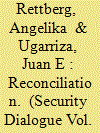

|
|
|
|
|
| Summary/Abstract |
There appears to be a rift between the theoretical and normative understandings of what reconciliation means and offers, and what people expect to happen in postconflict scenarios. Here we present a conceptual framework that captures the definitional diversity surrounding the concept of reconciliation and then operationalizes it in order to analyze responses from postconflict populations. The illustrative application of our framework to responses from a representative survey of 1,843 Colombian citizens reveals that people’s convictions are just as diverse as scholars’. Nevertheless, significant proportions of respondents seem to understand reconciliation to be primarily a psychological and political process which aims to achieve the re-establishment of quotidian or day-to-day relations and cooperation; which should be preceded by the cessation of violence, dialogue, goodwill, and attitudinal and emotional change; and which should be accompanied by social welfare and security. It is noteworthy that understandings of reconciliation as a process mediated by justice, truth, and memory are scarce. The application of this framework will help to reveal differences between hopes and promises, and inform scholarly work and policymaking that is more realistically rooted.
|
|
|
|
|
|
|
|
|
|
|
|
|
|
|
|
| 14 |
ID:
190839


|
|
|
|
|
| Summary/Abstract |
In states emerging from mass violence and human rights abuses, do individuals prefer retributive punishment of perpetrators through trials, or do they wish to be compensated with land or monetary reparations for their injuries? How does the concrete option of prosecutions by the International Criminal Court (ICC) moderate these preferences? Using unique survey data from 507 Kenyans collected in 2015, we build on and add nuance to the empirical literature that interrogates the link between exposure to mass violence and post-conflict justice preferences. We find that while some individuals prefer reparative justice, victims and witnesses generally want perpetrators to be prosecuted. Even for those who are co-ethnics of government leaders – who allegedly instigated widespread killing, sexual assaults and displacements – direct exposure to those acts leads to greater desire for prosecutions. We further find that one’s personal experience with violence also leads one to reject domestic justice in favor of international justice: victims and witnesses who favored retributive justice are highly likely to believe that the ICC is the best option for prosecuting perpetrators.
|
|
|
|
|
|
|
|
|
|
|
|
|
|
|
|
| 15 |
ID:
140871
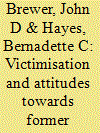

|
|
|
|
|
| Summary/Abstract |
The release of ex-combatants and the mechanisms for their re-integration within society has become an increasingly controversial issue in peace settlements. Yet to date, the view of victims concerning such arrangements in post-conflict societies remains unexplored. Mindful of this omission and using Northern Ireland as a case study, this article investigates the relationship between victimisation and attitudes towards the treatment of former political prisoners. Based on the 2011 Northern Ireland Social and Political Attitudes Survey, the results suggest that individual victims—those who directly and/or indirectly experienced violent incidents—are notably less supportive of a punitive approach towards the treatment of former political prisoners than non-victims. Moreover, this is particularly the case when victims from within the Catholic community are considered. The Northern Ireland evidence suggests that victims can act as a positive and inclusive force in terms of the rehabilitation and re-integration of former combatants in societies emerging from conflict.
|
|
|
|
|
|
|
|
|
|
|
|
|
|
|
|
| 16 |
ID:
148911
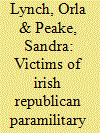

|
|
|
|
|
| Summary/Abstract |
Throughout the history of Northern Ireland's (NI) “Troubles,” over 3,800 individuals were killed, with between 40,000 to 100,000 individuals injured, leaving many families and communities struggling with the aftermath. In recent times a particular category of victims and survivors has been politically active and thus featured prominently in the media: “The Disappeared.” This label has come to represent the victims of paramilitary groups whose remains were secretly disposed of. Through a long public and political battle the families of the Disappeared have achieved a measure of political success resulting in the establishment of the Independent Commission for the Location of Victims' Remains (ICLVR). Achieving political voice is not the only or perhaps the most significant difficulty encountered by these families. Their experiences in fact epitomise the complexity of the conflict and divisions in NI society and reflect the dominant issues of loyalty, identity, and importantly—silence. Throughout The Troubles, this silence and related notions of loyalty permeated all levels of society: at a community level which included the response of the church; at a statutory level including the response from social services and police; and, at a political level including local political processes but also departments within the British and Irish governments. This article examines the experiences of the families of the Disappeared through a multilevel analysis of their public campaign seeking the return of the remains of their family members. Using data collected from the families, members of the ICLVR, and support workers, the experience of the families of the Disappeared are analysed through accessing the social dynamics of silence (and loyalty), in-group affiliations, notions of sacrifice, and the attribution of blame; political successes both national and international will also serve to frame the analysis.
|
|
|
|
|
|
|
|
|
|
|
|
|
|
|
|
| 17 |
ID:
152882
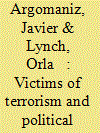

|
|
|
|
|
| Summary/Abstract |
Terrorism and political violence exist fundamentally as communicative acts; inherently the acts themselves serve to inspire anxiety and fear. As the recipients of such a communicative act, victims of terrorism and political violence serve as the vehicle for the dissemination of these communications to both the intended and broader audiences. Their victimising experience is thus a complex interplay between a profound personal trauma and the political/communicative dimension of the attack. Given this complexity, this article addresses how victims’ needs are understood by victims of terrorism and political violence in both Northern Ireland (NI) and Great Britain (GB). Through engagement with practitioners, victims, survivors, and community activists, this article conceptualises the existing perceptions amongst these different groups regarding needs, the delivery of services to victims in NI and GB, and examines the origins of the different approaches. Results demonstrate that victims’ needs are highly context-dependent at a public level, but relate heavily to the experiences of other victims of terrorism and political violence at a private level.
|
|
|
|
|
|
|
|
|
|
|
|
|
|
|
|
| 18 |
ID:
171696
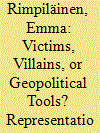

|
|
|
|
|
| Summary/Abstract |
This essay examines how the Ukrainian and Russian government-owned newspapers, Uriadovyi Kurier and Rossiiskaya Gazeta, represent people displaced by the war in Donbas, analysing the political goals revealed by these publications’ attitudes towards the displaced. While the Ukrainian publication delimits the nation by distinguishing ‘real’ internally displaced people (IDPs) deserving help and ‘fake’ IDPs guilty of siphoning Ukrainian taxpayers’ money to rebel-held areas, the Russian paper foregrounds the Russian state's competence in managing displacement while silencing the displaced themselves.
|
|
|
|
|
|
|
|
|
|
|
|
|
|
|
|
|
|
|
|
|